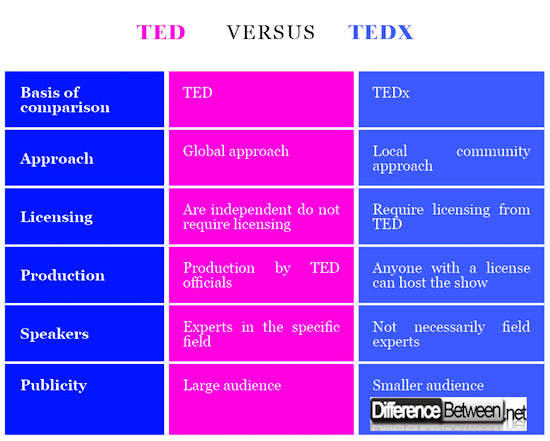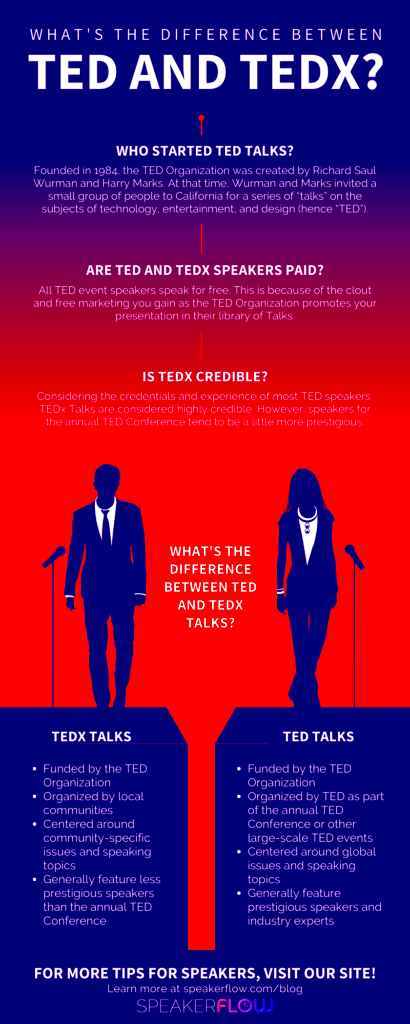Introduction: Understanding TED Talks and TEDx Events
When it comes to captivating talks that spark curiosity and inspire change,
TED Talks and TEDx events are at the forefront. Both platforms have become synonymous with powerful storytelling and groundbreaking ideas. Yet, there’s more to these events than just the famous red dot and inspiring speakers.
TED Talks are curated by the global
The Origins and Mission of TED Talks
 TED
TED Talks began as a conference in 1984, aiming to bring together people from Technology, Entertainment, and Design—hence,
TED. Over the years, it’s evolved into a global platform for sharing ideas worth spreading. The core mission of
What Sets TEDx Apart: A Community-Driven Approach
While
TED Talks are curated by a central team, TEDx events are organized independently by local communities. This decentralized approach is what gives TEDx its unique flavor. Each TEDx event is tailored to its local audience, reflecting the diverse voices and ideas of that particular community. I had the chance to attend a TEDx event in my hometown, and it was fascinating to see how local issues and personal stories were brought to the forefront. These events often feel more intimate and immediate, as they address topics that resonate deeply with local audiences.
Key differences include:- Organization: TEDx events are organized by local volunteers, while TED Talks are managed by the TED organization.
- Scope: TED Talks have a global reach, whereas TEDx events focus on local or regional issues.
- Content: TED Talks feature high-profile speakers and topics, while TEDx events offer a platform for emerging voices and grassroots ideas.
This local touch not only highlights diverse perspectives but also fosters a sense of community and engagement. Each TEDx event is a reflection of its own community’s passion and innovation, making it a unique experience in its own right.
Differences in Scope and Reach
When it comes to scope and reach,
TED Talks and TEDx events chart their own courses.
TED Talks have a global footprint, reaching audiences worldwide through their website, social media, and various platforms. I remember the first time I watched aOn the flip side, TEDx events are much more localized. They are organized by volunteers who are passionate about sharing innovative ideas within their own communities. The topics covered are often more relevant to local audiences, and the speakers are frequently community members who have compelling stories or insights to share. This makes TEDx events feel like a local celebration of ideas, where you’re likely to hear from someone whose daily life you can relate to.
Comparison Table:| Aspect | TED Talks | TEDx Events |
|---|
| Scope | Global | Local/Regional |
| Audience Reach | Millions worldwide | Community-specific |
| Topic Relevance | Broad, global issues | Local issues and personal stories |
In essence,
TED Talks provide a global stage for universal ideas, while TEDx events offer a platform for local voices to shine.
Content Creation and Speaker Selection: A Behind-the-Scenes Look
The process of creating content and selecting speakers for TED Talks and TEDx events reveals a lot about their respective approaches. TED Talks are known for their meticulous curation. The TED team sifts through numerous submissions to select speakers who not only have groundbreaking ideas but also have the ability to present them in a compelling way. I had the chance to attend a TED conference once, and it was clear that every speaker had been chosen not just for their expertise but for their ability to engage and inspire an audience.TEDx events, on the other hand, are organized by local teams who have more flexibility in their content creation. They often work with local figures, emerging thinkers, and passionate individuals who may not yet be known on a global scale but have intriguing ideas. The process is more grassroots, and you often find that the speakers are community members who bring a fresh, personal touch to their talks. I recall a TEDx event where the speakers ranged from a local artist to a young entrepreneur, each sharing their personal journey and insights.
Content Creation and Speaker Selection Comparison:- TED Talks: Centralized selection process, high-profile speakers, and polished presentations.
- TEDx Events: Local, community-driven selection, often featuring emerging voices and personal stories.
Both platforms have their unique processes, but they share a common goal: to present ideas that challenge, inspire, and educate.
Impact and Influence: Measuring the Effectiveness of TED vs TEDx
Assessing the impact and influence of TED Talks versus TEDx events can be quite enlightening. TED Talks, with their global reach, often have a significant impact on a broad scale. They can influence public discourse, spark new trends, and even lead to significant changes in policy or practice. I remember a TED Talk on climate change that not only educated me but also motivated me to change my personal habits and advocate for environmental issues. The global visibility of TED Talks amplifies their potential to effect change.TEDx events, while more localized, can have profound effects within their communities. They often address issues that are directly relevant to local audiences and can lead to tangible changes in local practices or policies. For instance, a TEDx talk I attended on urban gardening inspired several community members to start their own local gardens, fostering a stronger sense of community and sustainability.
Impact and Influence Comparison:- TED Talks: Global impact, broad influence, and high visibility.
- TEDx Events: Local impact, community-specific influence, and often immediate, actionable outcomes.
Ultimately, while TED Talks and TEDx events operate on different scales, both play crucial roles in spreading ideas and driving change. Whether it’s a global phenomenon or a local spark, each contributes uniquely to the larger conversation.
Personal Stories: How TED and TEDx Have Shaped Lives
One of the most compelling aspects of TED and TEDx events is their ability to touch lives in profound ways. I’ll never forget the TED Talk by a woman who shared her journey overcoming a severe disability. Her story wasn’t just inspiring; it changed my perspective on resilience and possibility. It’s these personal connections that make TED Talks resonate deeply.Similarly, TEDx events often highlight local heroes and everyday innovators. At a TEDx event I attended, a high school teacher shared her creative approach to engaging students in STEM. Her passion was contagious, and it led to a community initiative that introduced more kids to science and technology. The impact was palpable: new programs sprang up, and students were more excited about learning.Here are a few ways TED and TEDx have made a difference:
- Inspiration: TED Talks and TEDx events provide real-life examples of courage, creativity, and innovation.
- Community Building: TEDx events foster local connections and support grassroots initiatives.
- Educational Impact: Many educators use TED Talks to supplement their teaching and inspire their students.
These stories are a testament to the power of sharing ideas. Whether on a global stage or a local platform, TED and TEDx have a unique way of shaping lives and sparking change through the stories they tell.
The Future of TED and TEDx: What Lies Ahead
Looking ahead, the future of TED and TEDx is both exciting and full of potential. TED has always been at the cutting edge of innovation, and its future promises even more groundbreaking content and technologies. I imagine TED will continue to push boundaries, perhaps incorporating more interactive elements or virtual reality to engage its global audience in new ways.TEDx, on the other hand, is likely to see an expansion in the variety of topics and formats. The decentralized nature of TEDx allows for tremendous flexibility, so we might see more niche topics and experimental formats emerge. I recall attending a TEDx event where they experimented with live art and storytelling—a refreshing change that kept the audience engaged and made the event memorable.Here are a few trends to watch for:
- Increased Use of Technology: Expect more integration of virtual and augmented reality in both TED Talks and TEDx events.
- Diverse Formats: Look out for new event formats and interactive elements that engage audiences in novel ways.
- Global and Local Integration: TED may continue to bridge global ideas with local contexts, while TEDx will likely amplify grassroots voices.
The future of TED and TEDx is bound to be dynamic and evolving, offering new ways to connect, inspire, and innovate. Both platforms will continue to play pivotal roles in shaping conversations and driving change around the world.
FAQ: Common Questions About TED Talks and TEDx Events
Here are some common questions people have about TED Talks and TEDx events, along with answers to help clarify how these platforms work:
What is the main difference between TED Talks and TEDx events?
- TED Talks are organized by the TED team and feature globally renowned speakers, while TEDx events are independently organized and focus on local or regional issues.
How can I become a TED speaker?
- For TED Talks, speakers are usually invited by the TED team based on their expertise and impact. For TEDx events, potential speakers can often apply directly through the event's website or be nominated by others.
Are TEDx events as impactful as TED Talks?
- While TEDx events may not have the same global reach as TED Talks, they have a significant impact on local communities and can drive grassroots change and innovation.
How are TEDx events funded?
- TEDx events are typically funded through a combination of sponsorships, ticket sales, and community support. Each event operates independently and is responsible for its own funding.
Can anyone organize a TEDx event?
- Yes, anyone can organize a TEDx event as long as they follow TED’s guidelines and obtain a license from TED. The event must adhere to TED’s rules and be independently organized.
These FAQs provide a clearer picture of how TED and TEDx events operate and how they might fit into your own interests or aspirations. Whether you’re looking to attend, speak, or organize, understanding these details can help you navigate the world of TED and TEDx more effectively.
Conclusion: Reflecting on the Value of Both Platforms
As I reflect on TED Talks and TEDx events, I’m struck by how each platform plays a distinct but complementary role in the world of ideas. TED Talks, with their global reach and high-profile speakers, offer a panoramic view of innovative thoughts and breakthrough ideas. They bring the world into our living rooms, sparking inspiration and offering new perspectives on a grand scale.On the flip side, TEDx events provide a stage for local voices and grassroots innovations. These events shine a spotlight on community-driven ideas and personal stories that might not get attention on a global platform. I’ve experienced the powerful impact of a TEDx talk in my own community, where a local entrepreneur’s story ignited a wave of new initiatives and collaborations.Here’s a quick comparison:
| Aspect | TED Talks | TEDx Events |
|---|
| Scope | Global | Local |
| Content | High-profile, widely relevant | Community-focused, niche |
| Impact | Broad and far-reaching | Immediate and local |
Both TED and TEDx have their unique strengths, and together they offer a rich tapestry of ideas and inspiration. Whether you're drawn to the global scale of TED Talks or the local flavor of TEDx events, both platforms have a remarkable way of connecting people, sparking change, and sharing stories that matter.
 TED Talks began as a conference in 1984, aiming to bring together people from Technology, Entertainment, and Design—hence, TED. Over the years, it’s evolved into a global platform for sharing ideas worth spreading. The core mission of
TED Talks began as a conference in 1984, aiming to bring together people from Technology, Entertainment, and Design—hence, TED. Over the years, it’s evolved into a global platform for sharing ideas worth spreading. The core mission of
 admin
admin








